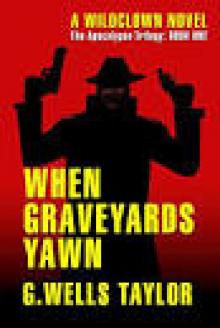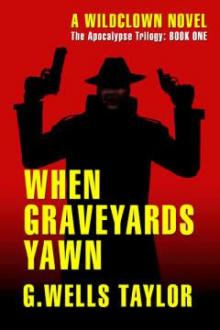- Home
- G. Wells Taylor
Dracula of the Apes 3 Page 4
Dracula of the Apes 3 Read online
Page 4
The men would make their beds with folded tarps and blankets arranged on the floor by the fireplace.
After sweeping out years of dust and debris, Virginia James took charge of setting up the women’s area and working with Lilly to pile the blankets that would make a suitable if somewhat lumpy mattress for them. She was pleased to have something to do to distract her worried mind while releasing some of the nervous energy that afflicted her.
Life with the Quarries had left her unaccustomed to hardship.
Everyone in the family called her Ginny and had since she’d first come into their employ—many, many years before—and she often thought back on the arrangement with a mixture of pride and sadness.
It had never been her intention to stay in perpetuity, but life had thrown a cruel twist at her that had watched her slowly move from a short-term position as maid to a live-in governess tasked with caring for the young Lilly.
Virginia remembered the first days of working for Archibald “Gusher” Quarrie very well because not long after accepting a position in his house, she had lost the love of her life.
A handsome Texan had visited one evening, a dashing and daring fellow with whom she had quickly been smitten.
She still kept the note he had given her that first night that they’d walked and laughed and finally come together as lovers beneath a tall ash tree.
“Wait for me. Love always, Q.M.” the note said as straightforward and honest as that. Q.M. her darling cattleman who’d gone away. She’d been 17 years old the night they’d met at the Quarrie mansion, and her but a maid to this beautiful, wealthy gentleman who spoke of marriage and children, and of settling at his family ranch.
There had been no official betrothal, only his proposal on bended knee there by the ash before they kissed and...
He was off to see a friend in England the following day, leaving his promise to return for a spring wedding, and the note.
“Wait for me...” it said, and she had waited for a year dreaming of the brief moment they’d had together, unaware of the eternal thing she’d lost.
Then the devastating news of his untimely death had reached her.
Virginia was never told the cause only that her lover had come to an unfortunate end while adventuring in the east, and so would never return; and as a mere maid for the Quarries with a verbal promise and a simple note, to whom could she have brought her suit?
If she even had one.
But Virginia would not be party to something silly or sordid, and so she hid her grief at the terrible news by burying her lost hopes in the years that followed as a maid-cum-governess.
Virginia continued on at the Quarrie place and was there when Gusher lost his wife Lizzy-belle in childbirth. The dear man had soldiered through that tragedy exhibiting a strength of character that his maid later came to emulate with a vigil of her own, for indeed, as time passed Mr. Quarrie foreswore the taking of another wife to honor his dead love.
Nurses had cared for baby Lilly at first as Gusher quietly educated Virginia to be her governess. She had always been good in school, and was able to guide some of Lilly’s education in letters with that. However, Mr. Quarrie added tutors to extend Virginia’s knowledge that she might be ready for the task of shepherding his daughter into womanhood.
Looking back, it seemed that time had flown ever since.
Now at 36 years of age, Miss Virginia James had abandoned all thought of love and marriage.
Such a fate had never been expected, but years into her employment—years in which she had prayed each night for her dead lover’s eternal rest—word had reached the young governess through Gusher’s associates that Q.M. had made a similar declaration of love and proposal to an English girl when he was visiting her country.
A month after receiving Virginia’s innocence in exchange for his promise, he had made a similar offer to another.
Virginia lost her faith in love at that, but she did not harden her heart against the man who had betrayed her. Instead, the truth simply strengthened her resolve to hold onto the spirit of what he had declared to her, and what she had given him in return.
Since she could not bear to think that she had wasted the time between her loss and this revelation, Virginia ignored the fleeting nature of human love and honor by seeking enduring satisfaction in her own loyalty, integrity and unshakeable resolve.
Virginia James kept her broken heart and her monumental embarrassment to herself, and like the heroines in romance novels, she chose to live in spiritual isolation, the mistress to a vaunted yet imaginary love, and keeper of a false flame.
There was a point many years into their individual sojourns of honor that Virginia suspected Gusher might have been developing some affection for her, but then his business speculation had taken him away on trip after trip, and their resolve was never tested or questioned again.
Virginia, her ward and family soon began a nomadic existence in which they were constantly following Gusher to some new and exotic location or awaiting him in some equally alien geography or conveniently positioned cosmopolitan center better suited to their amenities.
While Gusher labored under a desert sun, or upon an icy wasteland, his daughter Lilly awaited him while dancing in ballrooms.
Virginia was proud that she had kept her own youthful beauty, and credited it in part to the luxurious life she shared with her young pupil. Many years exposure to the world’s finest salons, cosmetics and beauticians had had the desired effect—and she would never have discredited it to Lilly as vanity.
After all, was not the best lesson taught by example? And Virginia had shown Lilly much.
The girl had grown into a bird of paradise, and looked the very part of a Greek goddess whether she was draped in the finest Parisian styles and fabrics, or dressed down in a simple riding jacket, breeches and boots for long days with her horses at the ranch.
From there it was simple. Virginia being but the second fiddle to the younger first and finer instrument knew it was her duty to accent Lilly’s music without ever distracting from it or offering a sour note.
There would be time enough when age would spoil the harmony.
Some years before, Lilly had been sent to England to stay with her maternal grandparents so she could be tutored in the gentle arts of a refined young lady and where she might meet some suitors of superior breeding.
Virginia remembered Gusher’s outbursts then, though she never saw his hypocrisy as anything more than a charming quirk of the oilman’s character for like many wealthy Americans, Quarrie would loudly denounce the British “prigs” and “lords,” while secretly coveting their “class” and “social status.”
A typically silly young teenager having experienced her first few kisses and semi-serious proposals, Lilly was less admiring of her father’s matrimonial sentiments or Virginia’s, who cast a similar solitary shadow in keeping with her own romantic tragedy.
Lilly claimed that she wished to marry, and make a grand union of it, having had several suitors from neighboring ranches and oil families back in Texas saying, “I will likely gravitate toward oil because it reminds me of cities and civilization. It is a refined substance far surpassing horse sweat, which is all I can smell on the vigorous men who work with the animals.”
Virginia had noticed that Lilly seemed to have picked up at least a “touch” of the class her father found so dubious, for prior to their notice of relocation to South Africa, the girl had grown petulant with her servants while exhibiting an “ill-natured” temper.
Back at the ranch, the oil money had been something to buy pretty horses with, but her time in high society had acquainted her with some of the favors it could purchase.
Lilly had been angered when instead of hiring a private ship to take her and the elder Quarries to South Africa, her father had ordered grouchy old Captain Seward to book them passage on a steamer. His selection the S.S. Dunwich had been common compared to the great luxury liners in which the European aristocracy were known
to sail.
Later, she got part of her wish aboard the sleek Lancet though its small size forced her to share some amenities with other travelers.
“Little better than steerage...” she had complained over tea the first night after their departure from Freetown. “Why old Jacob might as well share a cabin as our gentlemen escort, it’s that bad!”
“Now Lilly!” Virginia scolded. “You know Jacob Raines is a valued employee to this family, and most especially to your grandparents both of whom would have been heartily put out if their manservant was forced to share the deck below with the engine and crew. You know your grandmother’s arthritis has begun acting up with the humidity over the water. Who would pour her hot baths?”
“Oh, Granby will always find something to complain about,” Lilly had complained herself. “And it’s Jacob’s constant attention that has made her and Grampy unable to look after themselves.” Her top lip curled. “What’s the use of being—uh, special—if I’m forced to travel with such regular company, especially a n—”
“Lilly! I needn’t remind you how valuable Jacob is to this family, or how outrageous it is for a young lady to put on an air of superiority while using vulgarities,” Virginia cautioned, but quickly relented with a smile. “Whether such an air is deserving or not.”
“I’m sorry Ginny,” Lilly had said, pouting. “It’s just I don’t understand why daddy’s dragging us to this godforsaken country. What am I to find for a husband—a monkey?”
Her soft white hands fluttered over her bosom.
“England fairly teemed with prospects, don’t you know.” She had smiled. “Oh Ginny, two of the gentlemen who were poised to promise me something claimed royal lineage.”
“Royal lineage? Be sure to settle for honest,” Virginia had said, frowning. “Get more than a promise from a man be his blood red or blue.”
But of course, Virginia knew the value of a man’s promise that had doomed her to a life without love, wedding or children.
No. Hers had been a real love and a true—regardless of how it had been squandered—and true love could always be assailed by fate. The love that she had felt need not diminish, and while it might be missing from the world for her, for Lilly it might be out there.
Virginia paused a moment in the jungle cabin, leaning over the newly made bed and wondering if she’d gone mad. How could she think of these silly things while in such dire straits? Surely, it was the effect of Van Resen’s goading optimism. She had already agreed to Lilly’s insistence that they dress for dinner!
The governess was surrounded by danger and the scientist wanted her to keep a stiff upper lip.
“And neither of us is even English!” She chuckled to herself as her mind shifted back to her previous train of thought.
There were princesses in the world, she knew that much. She’d met some during their stay in London, and a single glance at young Lilly was proof that they existed.
Surely there might be a prince out there somewhere, too?
CHAPTER 5 – Gazda
Gazda squatted over the carcass and used the large knuckles of his right hand to wipe at the scarlet that stained his puckered lips. He had just sucked down the last of the panther’s hot blood, and was now deciding whether he should skin the beast.
The night ape had almost perfected the process of preparing the hides: scraping the flesh off with his sharp nails or the edge of his long knife, stretching and drying the skins on Fur-nose’s racks, and then working the drying pelts between his strong fingers to soften them.
A chirping sound from overhead brought his piercing eyes up to regard the green canopy and the darkening sky behind it. The sun was setting.
He looked back down at his prey and grunted.
Gazda had inherited the pragmatic nature of his adoptive tribe of apes, and so he shifted his gaze to gauge the condition of the black panther skin loincloth that hung from his taut waist. He had worn the garment for many months already, but it was still comfortable.
The night ape shrugged.
He had hides aplenty at his lair, so had no need to skin the corpse at his feet.
Gazda would replace his loincloth when it lost its luster, well before the jungle damp had rotted it. His super-charged olfactory powers would demand the exchange.
Black panther fur was still best for obscuring his work as a nocturnal hunter, though the beasts had grown more rare than their spotted cousins. Under the full moon, Gazda wore capes made from the ebon hides, but at most other times he restricted his camouflage to mud-skin spread over his muscular limbs. He found the capes confined his movements while on the hunt and the slick covering was enough to keep his white body from shining.
He still had hidden caches of the capes at the Grooming Rock, Two Trees and Fur-nose’s lair, but they tended to rot before he could use them. The garments were striking but impractical.
Still, he preferred the black panther for that use, and to honor the first lessons taught him by the dangerous beasts. Patterning his hunting techniques after theirs had made him the most lethal predator in the jungle.
So panthers were often in his thoughts when he beat upon his chest and sounded the victory cry of a bull ape over the bodies of prey and enemies alike.
Yet, he had resisted giving that call over this kill even though the panther had eluded him for several nights and deserved the dedication. Gazda smiled fiercely, remembering the hunt.
The beast had taken him on a long, meandering chase that had led north and south again over three days until its climax in the dense forest near the night ape’s lair.
He had surprised the panther by lying in wait before the sun had set.
The predator had earned the night ape’s admiration, but Gazda could only honor him in his thoughts for he knew his victory call traveled many miles, and the sound would alert Sip-sip to his presence.
Of late, the night ape had grown hungry for his enemy’s blood.
Five months had passed since Gazda’s becoming the silverback, and despite his new responsibilities he had tracked the crippled ape many times.
If he came across old trails, or caught wind of the fugitive’s running sores, he would charge recklessly in pursuit. Always, the trail had faded, or would lead him to another predator’s rotting kill or a noisome fungus that only smelled like Omag.
Once a promising trail led Gazda far to the east of his tribe and to the very border of his lands, where a lifetime of respecting Goro’s edicts had left the night ape hesitating.
He was far from home, memory of Goro’s death was fresh and the tribe was traumatized, but his hate for Omag was such that he had cast all other considerations aside. Gazda was into the trees and across the border in a heartbeat, where upon an eastern course Sip-sip’s spoor followed a river and the tracks of many Bakwaniri.
Gazda had known that he was close to the bone-faces’ territory for their trail had been clear where he had followed Omag’s into the border lands.
But, the night ape did not fear the Bakwaniri, and had long been curious about their distant lair; yet he had passed over his hatred for them in his pursuit of Omag.
The crippled ape’s treachery had always been upon his mind, and now his absence was explained. Sip-sip had passed over the border.
Goaded by his need for vengeance, Gazda had moved swiftly on Sip-sip’s trail, and was spurred to greater speeds when he saw the tracks grew younger the farther east he flew.
And there by the rippling water he found them to be a half day old and no more.
Akaki had told Gazda of Omag’s cave by the river near the bone-faces!
So the night ape had sprinted after the traitor until his trail disappeared at the water’s edge.
Casting farther north and east, Gazda found a jagged cliff of granite over which jungle grew like hair, and there, old marks in the dirt had led him to a cave high in a sheer gray wall that he scaled with thorny vines.
He did not find Omag within, but the crippled ape’s hideous tale was told
by the grisly contents of the damp and dripping cleft.
Scarlet trails were marked upon the floor in places, as though many bleeding things had been dragged—or had dragged themselves.
There were places on the angled walls were marks had been scratched by broken fingers, and sometimes by splintered bones.
Shapes and images had been set there in blood and gore that looked like birds, trees and the moon and other symbols resembling those that Gazda had seen in Fur-nose’s skin-stones.
Reeking of rot and dung the recess slanted up toward the back where a flat space held the crippled ape’s bed of stinking leaves; and in all corners lay the cracked and gnawed bones of Bakwaniri females.
It had seemed to Gazda’s acute perception that the shadows still rang with screams of pain and torment; and though the stench of death lay heavy in the place, he delayed in the dark to look and see.
Flesh still hung on partial skeletons that littered the stained stone floor. Shriveled and dead Bakwaniri faces clung to broken skulls; the females’ mouths hung open and pleading, their gaping eye sockets were shaped by sorrow.
In other places on the many corpses the skin had been flayed and muscle torn away so the narrow bones could be split in place and drained of marrow.
So the victims might live to be fed upon another day.
The track and trail of the crippled ape had led nowhere farther, only telling Gazda that Omag had not been to his cave for weeks.
After one last look around Sip-sip’s butcher house, Gazda had smiled, hoping that his next visit would coincide with the crippled ape’s.
He swore to bring vengeance against Omag—delayed or not—and it would come, as he would punish Magnuh should the jungle giant return. Still, the bull elephant had not been seen within Gazda’s lands, and any of his tracks had been long lost to rain or trampled over by other beasts.

 Dracula of the Apes 2
Dracula of the Apes 2 Dracula of the Apes 3
Dracula of the Apes 3 The Urn
The Urn Painkiller
Painkiller The Forsaken - The Apocalypse Trilogy: Book Two
The Forsaken - The Apocalypse Trilogy: Book Two When Graveyards Yawn
When Graveyards Yawn The Variant Effect: PAINKILLER
The Variant Effect: PAINKILLER When Graveyards Yawn ta-1
When Graveyards Yawn ta-1 Painkiller tve-2
Painkiller tve-2 The Variant Effect
The Variant Effect